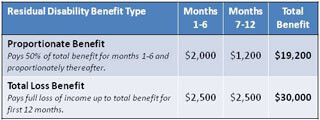
The residual disability benefit is one of the most important features to evaluate when purchasing an individual disability insurance policy because it enhances the policy to include benefits for PARTIAL disability and not just TOTAL disability. Since 90% of new disability claims are caused by illness, and most illnesses do not totally disable a person over-night, it is logical to assume that many claims will start or end (if not both), as a partial disability. For this reason, it is critical that consideration is given to residual disability benefits.
Qualifying for Partial Benefits
It is important to recognize that every disability insurance policy is unique and should be carefully reviewed at the time of purchase. In general, there are two ways that a partial disability claim can be triggered: Loss of Time or Duties: Solely due to injury or illness, you are able to perform the primary duties of your occupation but are prevented from performing them the normal amount of time required OR you are able to work full-time but prevented from performing one or more of the primary duties of your occupation. Loss of Income: While gainfully employed and not totally disabled, solely due to injury or illness, you experience a loss of income that is at least 15-20% of your prior income. The required percentage loss of income varies by policy and should be carefully reviewed. Consumers should be aware that each insurance company will use their own wording and eligibility requirements for these benefits. Logically, it is easier to qualify for residual benefits with only one requirement instead of multiple requirements.
Partial Disability Benefit Calculation

Recovery Benefits
The recovery benefit is payable when a person returns to full-time gainful employment following a period of disability for which benefits were paid, but still has a 15-20% loss of income due to the injury or illness that caused the original disability.
This benefit is particularly important for physicians, dentists, attorneys and other fee-for-service professionals, but can really affect anyone. Consider the effect of a solo medical or dental practice closing for an extended period of time. Even after reopening on a full-time basis, the profitability is likely to be reduced substantially. The loss of income experienced after an extended disability can continue for months, years and possibly be indefinite. For this reason, the benefit period available for recovery benefits requires careful consideration.